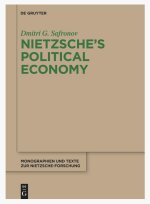Nietzsche’s Political Economy

Author: Dmitri G. Safronov (Girton 2016)
Publisher: De Gruyter
Nietzsche’s Political Economy is a pioneering appraisal of Nietzsche’s critique of industrial culture and its unfolding crisis. The author contends that Nietzsche remains unique in conceptualizing the upheavals of modern political economy in terms of the crisis of its governing values. Nietzsche scrutinises the norms which, not only preside over the unfathomable build-up in debt, the proliferation of meaningless, impersonal slavery and the rise of increasingly repressive social control systems, but inevitably set these precarious tendencies of modern political economy on a collision course liable to culminate in an unprecedented human and environmental catastrophe. Safronov explores the core themes of Nietzsche’s political economy—debt, slavery, and the division of labour—with reference to the influential views of Adam Smith and Karl Marx, as well as against the backdrop of the Long Depression (1873–1896), the first truly international crisis of industrial capitalism, during which most of Nietzsche’s work was completed.